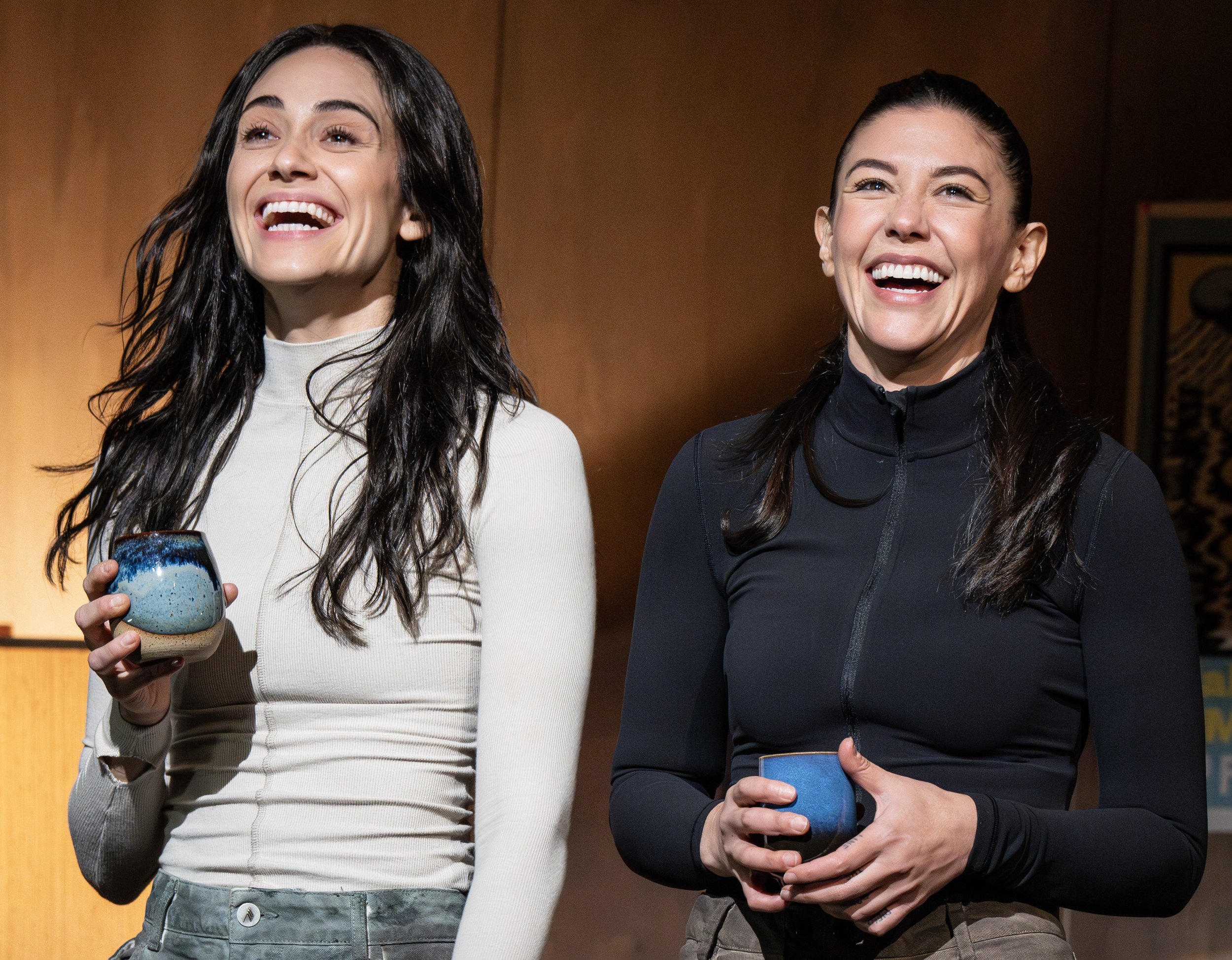Stella (Emmy Rossum, left) and Cassie (Zoë Winters) are twin sisters in Amy Berryman’s Walden.
Given recent electoral events it doesn’t require a huge imaginative leap to envisage a dystopian United States in the “not-so-distant future.” That future is when Amy Berryman’s philosophical, sci-fi–infused play Walden, which premiered on London’s West End and now comes to Second Stage Theater, takes place, depicting a world wrecked by climate catastrophe, human folly, and rapaciousness.
Is the earth worth saving or should humanity pursue a new wave of colonization—with all the baggage that word carries—on the moon or Mars? Perhaps instead of science and exploration what is needed is a back-to-the-earth (or what’s left of it) primitivism. Berryman asks these weighty questions through the conflicts of domestic drama—Walden is a story of twin sisters at personal and professional crossroads in a fast-dying world.
The play’s opening line is “Is she here?,” but before the “she” in question is specified, Stella (Emmy Rossum) watches a newscast on her smartphone:
Turning now to update you on the tsunami, which some scientists are now referring to as a “mega” tsunami that hit the east coast three days ago—the number of missing persons presumed dead has grown to almost one million as the number of those seeking Climate Refugee status continues to climb.
Cassie’s return has dredged up painful memories for Stella, here comforted by her fiancé Bryan (Motell Foster).
Walden doesn’t traffic in the cryptic, slow reveal; questions are answered, context is laid out, unfamiliar terms (such as EA, or Earth Advocate) are quickly explained. The visiting “she” is Cassie (Zoë Winters), freshly returned from the moon and something of a celebrity, having achieved the remarkable feat of making something grow in moon dirt. She drives deep into the wilderness to visit her sister Stella, who lives in a Thoreau-like cabin, complete with nearby pond, with her EA fiancé Bryan (Motell Foster). But Cassie (short for Cassiopeia—the twins’ father was an astronaut too) doesn’t know any of the details of her sister’s new life.
Cassie arrives with a high-tech mask but Bryan assures her the air quality is good. He and Stella have carved out something almost idyllic amid global catastrophe: animals are returning to the wilderness, the air is healthy, vegetables can be grown in the earth. Cassie is abrasive (when Bryan tells her that he and Stella are getting married, her response is “Why?”), and suspects her sister, a former NASA scientist, is being constrained by the EA life, her potential squandered. They barely get through pleasantries before they are arguing about Bryan:
Stella: He doesn’t judge me. For the work I used to do. And I don’t judge him.
Cassie: “Work you used to do?”
Stella: He thinks the government should be spending all that money on saving this planet, instead of looking for somewhere else to go—
Cassie: And you know that it’s way too late for that….
Stella: Cassie, this is the border of Earth Advocate Community. It’s growing, it’s huge, and over the years … it seems crazy, but their impact seems to have made a difference. Even in the summers, it hasn’t been over one hundred and twenty degrees, ever, apparently.
Cassie has just returned from a year on the moon to an earth that may not be habitable for much longer. Photographs by Joan Marcus.
The oppositions and apparent differences between Cassie and Stella shape the play—ironically, since a DNA test has revealed them to be identical, even though they always assumed they were fraternal twins. Personal history is dredged up, and there are revelations and recriminations and secret desires. Why is Cassie really there? Is Stella resentful or content? Is Cassie as rational and work-focused as she pretends? When Stella worked for NASA she designed a Mars colonization mission that she named Walden, a book their father revered but that Cassie feels “reads like a whiny hipster’s blog from nineteen-whatever.”
Nothing lags under Whitney White’s fast-paced direction. Matt Saunders’s scenic design beautifully renders the cabin and its immediate surroundings (perhaps it looks almost too nice and appealing), while Adam Honoré’s lighting and Lee Kinney’s sound design are especially effective during a wordless sequence of environmental catastrophe. The ideas that drive the play are interesting, but they’re too often inserted so directly into the characters’ mouths that these exchanges come across as purely expository.
This has the effect of flattening the characters. Foster is assured and charismatic, but Bryan nonetheless feels like a walking thesis; Rossum captures Stella’s nervous intelligence but her trajectory is muddled by the revelation-happy ending; Winters’s Cassie is so strident and unpleasant at first that her turn toward vulnerability and doubt is less credible. That said, Walden is admirably ambitious, a play that grapples with big ideas, appropriates sci-fi elements, and contemplates Thoreau’s legacy and humanity’s uncertain future.
Walden runs through Nov. 24 at Second Stage (305 W. 43rd St.). Evening performances are 7 p.m. Tuesday through Saturday; matinees are at 2 p.m. Wednesday, Saturday, and Sunday. Tickets are available by visiting 2st.com.
Playwright: Amy Berryman
Director: Whitney White
Scenic Design: Matt Saunders
Costume Design: Qween Jean
Lighting Design: Adam Honoré
Sound Design: Lee Kinney





